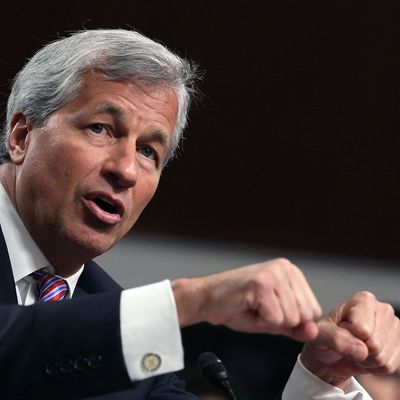
Jamie Dimon wants you to know that he is not happy. He is not happy that JPMorgan Chase’s shareholders are being asked to submit a non-binding vote on whether or not to strip the tough-talking CEO of his board chairman role and make him answer to a boss for the first time in seven years. He is so unhappy about this development that if the vote doesn’t go his way, he will start packing up the corner office and leave the bank. Really, he means it. No, seriously. He’ll leave.
It’s no coincidence that we’re hearing about Dimon’s threat now, just as the shareholder proposal that would erase half his job is picking up steam. Both ISS and Glass-Lewis, the two big shareholder advisory firms, support the proposal, meaning that unlike last year (when a similar proposal picked up 40 percent of the vote), this year’s attempt to take Dimon down a peg might actually work.
What’s interesting is Dimon’s game theory here. Theoretically, he could allow shareholders to vote for the split, then (since it’s non-binding) privately pressure the board into keeping him as chairman. Instead, he’s waging a subtle campaign to keep the proposal from even getting to the board’s desk.
The primary plank of any good keep-your-job campaign is trotting out your friends and defenders, which is why we get Ken Langone talking about how great Dimon is and how “terrified” it makes him to consider a Dimon-less JPMorgan Chase.
But Dimon clearly doesn’t think his likability alone will win him this fight, so he’s also trying to make it clear that his power at JPMorgan Chase is already limited, thereby implying that there’s no need to dilute it even further by splitting the CEO and chairman roles. How to do this? Well, one way is to make it clear that the current lead director of JPMorgan Chase, former Exxon Mobil CEO Lee Raymond, is a tough sonofabitch who can stand up to Dimon just fine as it is. Which is why we get articles like this filled with details about how Raymond is “no pushover” and “never shied away from a tough battle,” and, presumably, how he eats glass for breakfast.
Then, today, we get the news that Dimon is holding himself hostage and has privately threatened to leave the bank unless he gets his way. From Reuters:
At first, Dimon said he would not comment publicly on what he would do if the vote went against him, but when pressed he added that the worst-case scenario would be to leave the bank, the newspaper said, citing sources that attended a private meeting at the company’s New York headquarters.
As Matt Levine points out, it may not matter whether Dimon gets the vote; the proposal is non-binding, and even if the board did decide to adopt it and split the roles, he’s going to be the loudest voice in the boardroom anyway. But Dimon clearly cares about the chairman’s title, for reasons that are probably better suited for a therapist to analyze. Maybe the idea of having a boss again has activated some sort of PTSD developed when he was fired by Sandy Weill. Or maybe he just thinks it’s fun to be loved and doesn’t want to work at a bank that doesn’t love him enough to give him both roles.
But crucially, Dimon is not really going all-in here. He’s not saying that he’ll leave the bank if shareholders vote to split his roles, just that he may consider leaving. That’s a relatively weak bluff, calculated to scare shareholders (who generally like Dimon, even if they think he’s too powerful) into backing down. So, will it work?
I submit to you that Dimon’s hand in this poker game isn’t as strong as he thinks it is, because, well, what better job could he possibly get? His natural next step would be politics, but thanks to the London Whale mess, he’s still too radioactive to be nominated for anything major in an Obama administration. Any banking job short of Lloyd Blankfein’s would be seen as a step down for him, and although he could surely get a private equity firm or a hedge fund to pay him huge money to perform some sort of ceremonial senior statesman role, I’m not sure he’d be happy as a figurehead. He could also retire, but that would look too much like admitting defeat.
What Jamie Dimon clearly wants at this stage in his life is complete, unfettered power, and there’s nowhere he’s likely to get more of it than in his current CEO/chairman configuration. He knows that JP Morgan shareholders are scared of losing him as CEO, and he’s betting that they’re scared enough to let him keep his chairman title, too.
If shareholders call Dimon’s bluff, we’ll see if he was serious about his threat. Right now, I’d take the under on him leaving the bank. But if he keeps floating the possibility, and shareholders vote against him anyway, he may not have much of a choice.





























